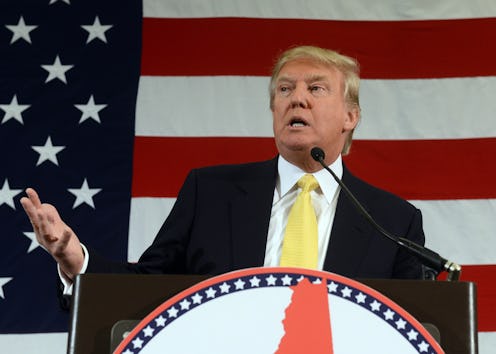News
Trump Promised His Pick Would Be Conservative

For the first 11 days of the Trump administration, one of the big political battles to come has been waiting for the announcement of his Supreme Court nominee. And on Tuesday, President Trump finally made his pick official: it'll be Neil Gorsuch, one of the names that got serious buzz in the final days running up to the decision. So, is Gorsuch a conservative pick for the Supreme Court? Or is this a compromise position that might woo some Democrats after the long, blistering year of GOP delay tactics against Obama's pick, Judge Merrick Garland?
The answer, as Trump had promised all throughout the presidential campaign and the transition, is yes. While the names that were bandied about in the final days may have varied as far as legal observers' assessments of their relative conservatism, all of them were firmly of that bent, and that really comes as no surprise ― there was no reason to expect Trump to extend an olive branch, even after the unprecedented delays and obstructions thrown in Garland's way.
Gorsuch is widely regarded as one of the most Scalia-esque of Trump's potential picks, reportedly possessing a judicial philosophy similar to the conservative icon's belief in constitutional originalism. In other words, it's believed that Gorsuch would rely on his understanding of what the U.S. Constitution's authors meant its words to mean at the time it was written, rather than interpreting and re-interpreting it in a modern context.
And although Gorsuch doesn't have a ruling under his belt relating to, say, abortion rights, originalism is a style of interpretation that predisposed Scalia against Roe v. Wade (as well as on issues of gender and LGBTQ rights), and given Trump's promises about picking pro-life justices, it seems a safe bet that he believes Gorsuch would rule to strike down reproductive rights. Indeed, as the Washington Post notes, a passage about euthanasia in a book by Gorsuch strongly suggests he would rule against the legal right to an abortion.
In his first interview as president-elect, with Lesley Stahl of 60 Minutes, Trump gave an illuminating answer on his upcoming pick. Namely, he said that while he considered same-sex marriage to be "settled" law thanks to the Obama-era court, he believed that Roe v. Wade should be overturned, despite his having identified as "pro-choice" as recently as 1999. No explanation was given for the apparent contradiction in that, considering the former has only been the law of the land for a couple of years, while Roe was ruled on back in 1973.
Regardless of who Trump ultimately picked, the Democrats will have a potentially loaded political situation on their hands as far as their political base goes. Amid fervent protests in the first several days of Trump's presidency, and jam-packed town halls imploring members of Congress to resist his agenda, there's clearly a thirst on the part of the progressive left to see the Democrats treat Trump the way the GOP treated Obama the last eight years, and that means resistance, obstruction, and blanket refusal at virtually every turn.
Suffice to say, there's going to be a lot of pressure for the Democrats to filibuster Gorsuch, even though it might lead to the filibuster being abolished ― Oregon senator Jeff Merkley, for one, has already promised to do so.